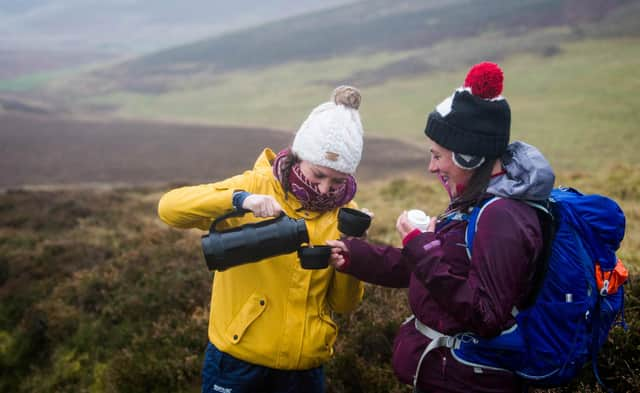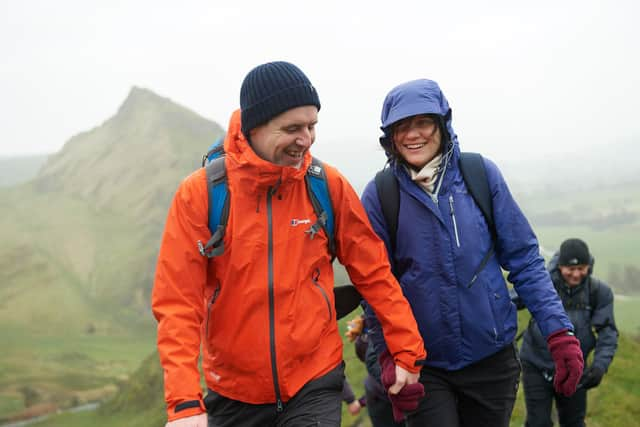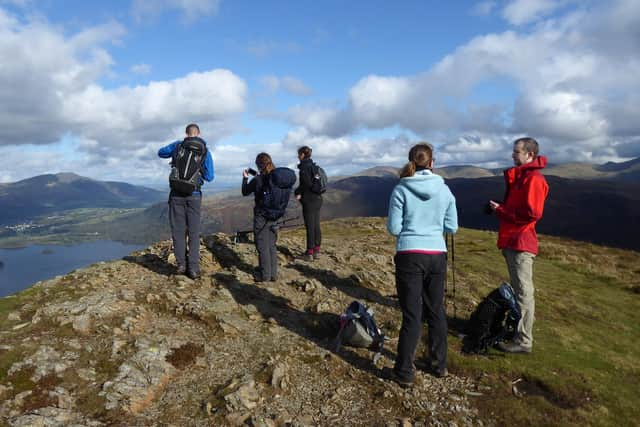Why Yorkshire’s favourite rambles could be under threat


On April 24, 1932, a troupe of around 400 walkers laced up their boots and hiked to the top of Kinder Scout, the highest point in the Peak District.
Such a walk might sound innocuous in 2020, but in 1932, the group were deliberately breaking the law: trespassing on land which was then owned by the Duke of Devonshire.
Advertisement
Hide AdAdvertisement
Hide AdThe mass trespass - organised by the British Workers' Sports Federation - was a protest against the increasingly limited public access to land following decades of enclosure across England’s countryside, and ended in five members of the group being arrested.


Though the action was not endorsed at the time by the recently-formed National Council of Ramblers' Federation, (today known as The Ramblers) it’s widely recognised as a turning point in the fight for walkers’ access to land.
The result, still visible today, is right of way paths and open access land across swathes of England - including the Peak District, which became England’s first National Park in 1951.
Walking has long been a popular outdoor activity, but the value of access to green space and nature has rarely been more evident than in 2020, a year when millions have turned to their local parks, woodlands and countryside to cope with the ongoing pandemic.
Advertisement
Hide AdAdvertisement
Hide AdThe case for strengthening walkers’ rights and protecting nature, it may seem, has never been stronger. Yet with the rapid decline of public green spaces, proposed trespass laws and new planning frameworks, ramblers fear their freedoms may once again be under threat.


While not all members of The Ramblers organisation are campaigners, all are passionate about the joys and benefits of walking - and would be devastated by diminished access to the outdoors.
In Yorkshire alone, there are twenty rambling groups who, prior to the pandemic, met at least once a week to roam the county’s coasts, hills and countryside.
Many of these walkers, says Stephanie Blevins, Chair of the Leeds Ramblers group, tend to be older people - often, like herself, experiencing a major life change:
Advertisement
Hide AdAdvertisement
Hide Ad“I personally came into walking because my family circumstances changed...I was in a family where my children went away to university...to be able to get out into the countryside was fantastic...it [The Ramblers] was pretty life-changing for me”.
With more time on their hands than working adults, retirees populate many of the walking groups in Yorkshire. The surging popularity of rambling groups aimed at those in their 20s and 30s, however, suggests that recreational walking is no longer a preserve of older generations:
“We’ve had a lot of new members recently”, says Stephen Down, who runs “Get Your Boots On”; a rambling group for younger walkers in East Yorkshire.
“We’d been struggling with membership for quite a few years…from what we’ve seen, lockdown has got [younger people] out walking”.
Advertisement
Hide AdAdvertisement
Hide AdWalking first became popular in the nineteenth century as an escape from the stresses of life in increasingly polluted cities. In a similar way, the recent upswing in recreational walking has undoubtedly been driven by the stresses of modern day life - and the anxiety of living through a pandemic.
“I made sure throughout March, April and May I got out every day”, says Stephen. “I’m pretty sure it stopped me from going completely potty...we’re so lucky with our landscapes in Yorkshire...there’s so much to explore”.
Coronavirus temporarily put a halt to The Ramblers’ group walks, and though briefly permitted to return in covid-safe groups of up to 30 (until the second national lockdown), few volunteer walk leaders were comfortable taking such large numbers. Instead, they opted for smaller groups who had to book weeks in advance. “It takes a lot of the spontaneity out of it”, says Stephanie.
She acknowledges, however, that this is the least of the Rambler’s worries. Today, Yorkshire is one of three areas in England which falls below the minimum standard of green space required for health and wellbeing.
Advertisement
Hide AdAdvertisement
Hide AdPublic green spaces, especially in urban areas, are in decline, with the number of people living further than a ten-minute walk from a park estimated to rise by five per cent in the next five years. Disadvantaged people will be hit the hardest.
It’s partly a result, says Tom Platt, Director of advocacy and engagement for the Ramblers, of restrictions in local authority budgets which have forced councils to sell off public assets.
The situation could be further exacerbated, he says, by new planning laws which divide land into three categories: “growth”, “renewal” and “protected”.
Any areas marked for “growth” will allow developers to erect new homes, hospitals and other buildings without prior approval from the local authority.
Advertisement
Hide AdAdvertisement
Hide AdThe move, says Tom, threatens to “oversimplify” the planning system, and risks “misunderstanding the context of that space and the importance of it to local people...we’re concerned that they [the government] aren’t putting a premium on the value of people’s access to nature”.
Changes to trespass law could be another roadblock for walkers in Yorkshire’s countryside. In late 2019, the government launched a consultation on criminalising “the act of trespassing when setting up an unauthorised encampment in England and Wales”. Walkers fear, however, that any changes could lead to an infringement on walker’s rights:
“It’s got a very dangerous edge to it”, says Lee Davidson, Footpath Officer for the Leeds Ramblers. “Anything that erodes the rights of people accessing the countryside, The Ramblers will make a large noise about - and quite rightly so”.
Even established pathways themselves could be in peril - with diminishing capacity in local councils for maintaining right of way paths to a usable standard, while a number of landowners, say walkers, similarly neglect path maintenance on their property.
Advertisement
Hide AdAdvertisement
Hide Ad“The ability of local authorities to carry out path maintenance has been limited”, explains Lee. “You’d be amazed at how many [problems on paths] are left until such time as I go along and report them, and something maybe gets done about it”.
The Ramblers have spoken out publicly against these threats, and continue to campaign fiercely for increased access to green spaces for all.
And while The Ramblers would ultimately advocate for an extensive Right to Roam policy similar to Scotland’s, their focus for the moment is opening up areas which they think will benefit the most people - especially those in urban areas who tend to be more disadvantaged:
“It’s actually about opening up woodlands and riversides - areas which we believe will have the biggest impact on people’s lives.”
Advertisement
Hide AdAdvertisement
Hide AdThe organisation, says Tom, are certainly concerned about the potential impact of changes to planning and trespass law, as well as the lack of investment in England’s pathways.
Nonetheless, The Ramblers remain optimistic that the coronavirus recovery could present an opportunity to build a greener world in which everyone has access to the outdoors.
Prior to coronavirus, says Tom, they’d had been working with the government on environmental and agriculture bills which contain “really great [environmental] ambitions”. If carried through, he hopes new laws could “advance the way in which we look after green spaces and people’s access to them”.
“The proof will be in the pudding”, Tom says, as to whether such aims - such as legal targets for access to green space - will actually make it through Parliament, but the increased public enthusiasm for walking will certainly bolster their cause.
Advertisement
Hide AdAdvertisement
Hide Ad“Essentially, we want the government to recognise how important the simple pleasure of walking and accessing the outdoors is to the nation’s health”, says Tom.
“Some of the great social reforms came after the crisis of the Second World War... my hope is that out of all this disaster there comes a renewed government determination to think boldly and ambitiously about improving people’s access to green spaces”.